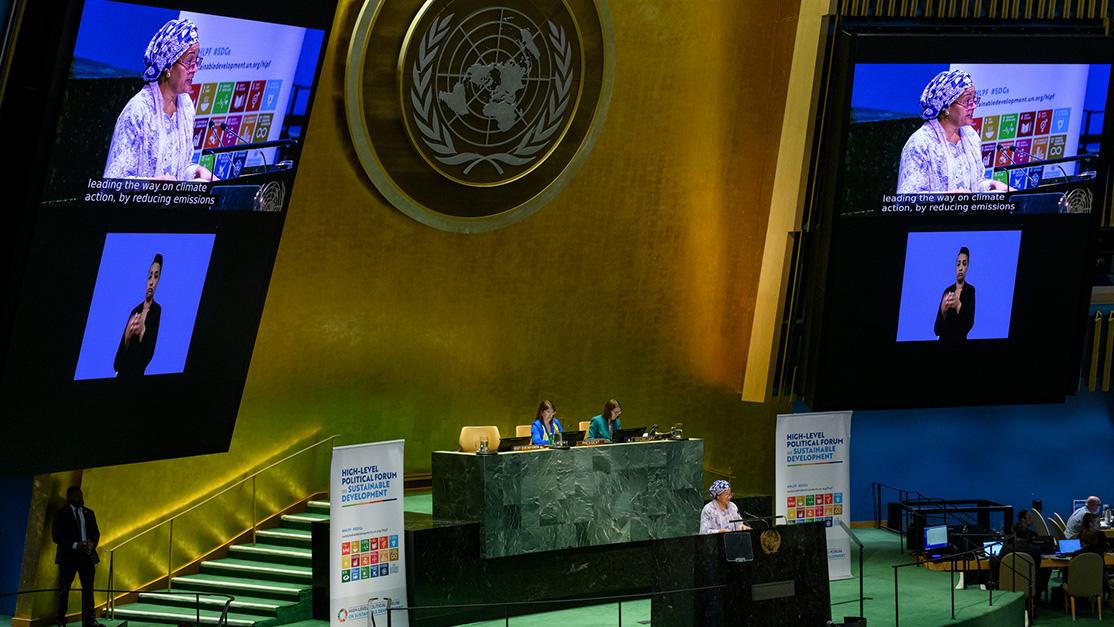More from UN DESA

Turbocharging SDG progress: 7 ways UN DESA leaves no one behind
The past 12 months have been pivotal for the Sustainable Development Goals (SDGs), with the adoption of the groundbreaking Political Declaration at the SDG Summit, as well as the Antigua and Barbuda Agenda for SIDS (ABAS) at the fourth International Conference on Small Island Developing States (SIDS).
UN DESA also helped build momentum for this year’s Summit of the Future, engaging Member States and other stakeholders in collective efforts to put the 2030 Agenda back on track.
The UN DESA Annual Highlights Report 2023-2024 showcases seven ways the Department supported UN Member States to advance the 2030 Agenda for Sustainable Development during the course of the 78th Session of the General Assembly. Here are the key highlights:
1. Accelerating action for the SDGs
Interlinked crises and ongoing conflicts continue to threaten SDG progress. Through the SDG Summit, High-level Political Forum on Sustainable Development (HLPF), SIDS Conference and other intergovernmental processes, UN DESA continued to work towards the bold, ambitious, and just transformations needed to achieve the 2030 Agenda. It galvanized multistakeholder engagement and partnerships at all levels, and mobilized efforts to advance the SDGs, including at local levels.
2. Reducing poverty and inequality
UN DESA remains steadfast in its commitment to leave no one behind. Its support to eradicate poverty, reduce inequalities, and address the structural weaknesses of countries in crisis underscores its dedication to creating a fairer and more equitable world for everyone. By empowering small businesses, supporting cooperatives, advocating for Indigenous Peoples’ rights and advancing disability inclusion, the Department drove significant changes across the SDGs.
3. Ensuring sustainable financing
Financing challenges are at the heart of the world’s sustainable development crisis. In the face of large and growing financing gaps for the SDGs, UN DESA spearheaded its vital support to Member States in establishing an inclusive and effective international tax system, as well as preparing for the fourth International Conference on Financing for Development in 2025 – our last chance to correct our course by the SDG's 2030 deadline.
4. Making data count
High-quality data serves as the bedrock of effective policymaking and strategic action. To support countries in obtaining accurate, timely and comprehensive data, UN DESA played a critical role in setting standards, as well as data collection and reporting to monitor and assess SDG progress.
5. Strengthening national institutions and accountability
Effective governance is a crucial component to achieve the SDGs. By assisting UN Member States to advance effective, accountable and inclusive public institutions, including through innovation, digital government and digital transformation, UN DESA promoted people’s well-being, especially those at risk of being left behind.
6. Ending the war on nature
The triple planetary crisis emphasizes the critical role of nature in underpinning sustainable development in all its dimensions. UN DESA addressed the drivers of the war against nature, advocating for a holistic and comprehensive approach to global energy transitions and the sustainable use and management of ecosystems such as the ocean, freshwater, and forests, among others.
7. Framing the future of development
Navigating complex and interconnected challenges requires us to be more resilient and prepared. UN DESA’s focus on forecasting, foresight, and long-term, intergenerational thinking helped strengthen the underlying capacities of countries and the multilateral system, as well as future generations’ ability to address present and future challenges.
Read more about these achievements in the UN DESA Annual Highlights Report available here.
Photo Credit: UN Photo/Loey Felipe
 Welcome to the United Nations
Welcome to the United Nations